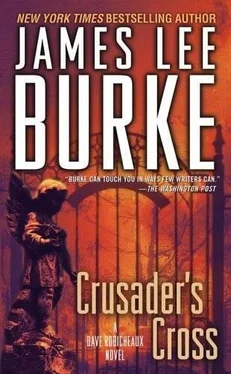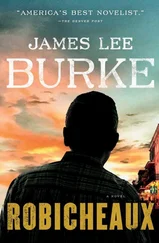"You buy it?" I asked.
She picked up a ballpoint pen and twisted it in her fingers, then let it drop on her desk blotter. "I'd already told the sheriff we believed Pitts may have been involved in a murder-for-hire plot. So I asked him why I had to find out about Pitts's death in the newspaper."
"And?"
"He said he'd been real busy of late."
"You talk to the coroner?"
"I have a call in. But it's not going anywhere. That place is corrupt even beyond Louisiana standards," she replied.
"Maybe it was just an accident, Helen. Guys like Pitts eventually blow out their doors."
"I'm going to ask NOPD to roust Jericho Johnny."
"Don't do it," I said.
She scratched her forearm. "Okay, boss man," she said.
That evening just at dusk, it rained hard, pounding on the tin roof of my house, the raindrops dancing with a strange yellow light on the bayou. Then suddenly it was quiet outside, the trees dripping, the air cool and smelling of flowers and wet leaves. I wanted to believe that Billy Joe Pitts had died accidentally, that there was no contract on my life, that I was no different from any other police officer or, for that matter, any ordinary person who went about his day with goodwill toward others and tried to do the best he could with the life he had. I did not want to believe that somehow I was a harbinger of violence and death, a man who dwelled in the cities of the dead and who trailed the stench of a necropolis wherever he went.
But I had always subscribed to the belief that there is no mystery to the human personality. People are what they do. My own record was one I did not care to examine. The faces of the men I had killed did not appear in my sleep, but sometimes, on the periphery of my vision, I saw a moving shadow, a figure inside the elephant grass, a tiny man in black pajamas and a conical straw hat, or I heard a voice, the phlegmy death rattle of the man who murdered my second wife, Annie, and whose life I took in turn. Or sometimes I sat on the edge of the bed, in the middle of the night, inside a square of moonlight, wondering if indeed the wind in the trees or the thropping of helicopter blades overhead was nothing more than the auditory manifestation of a world at peace or if in fact hell was a place that some individuals carried inside themselves the rest of their lives.
I did not trust myself alone anymore. Sometimes I thought I, too, was infected with bloodlust. There were moments when I could feel shards of color explode behind my eyes, a balloon of anger surge in my chest without cause. I avoided watching the evening news. I would quickly turn off the radio in my truck when I would hear the voices of what we used to call REMFs, rear echelon motherfuckers, cheering on a war they or their family members would never serve in. There were moments when I had thoughts I would never share with anyone.
I wanted to reclaim my dead wife and lead her back from the underworld, as Orpheus did when he stole Eurydice from Hades.
In the Friday issue of the Daily Iberian was a feature story about a picnic and hot dog roast at Sister Molly Boyle's self-help housing agency and a race down Bayou Teche involving hundreds of plastic ducks. According to the article, the children would draw numbers from a barrel that corresponded to numbers painted on the bottom of the ducks. Then at 10:00 a.m. the ducks would be released at the drawbridge on Burke Street, when the tidal current was flowing southward. Eight miles down the Teche the first ten ducks across the finish line would determine which children would win a T-shirt with Donald Duck's face ironed on it.
I convinced myself my attendance Saturday morning at the picnic was innocent in nature. It was a fine day, the sun covered by rain clouds, the wind flecked with salt, the Spanish moss straightening in the oak trees along the bayou, Frisbees sailing through the air. What could be wrong in eating ice cream and grilled frankfurters among people of color for whom a plastic duck race down the bayou was a grand event?
But it wasn't long before I found ways to put myself next to Sister Molly Boyle. I helped her set tables, turn franks on a flame-streaked grill, paint margarine on hot dog buns, and finally to dip ten ducks out of the water with a crab net.
It was all in the spirit of fun, wasn't it?
But regardless of what I was doing, my eye would travel to wherever she was on the grounds. I felt foolish and wondered if I had entered that self-deluded stage in an aging man's life when others have to protect him from knowledge about himself.
She was certainly lovely to look at. She was hard-bodied, her jeans stretched tight on her rump and hips, her shoulders powdered with freckles, her red hair feathered with light when the wind blew it, her eyes interested in whatever was being said to her, without any sign of impatience or hidden thoughts in them that I could see. My brother was a light-bearer. I believed Molly Boyle was probably one, too.
I went into the office to use the restroom. As I was coming out, I saw a little boy wandering in the hallway, about to wet his pants. I took him into the restroom and helped him use the toilet and wash his hands. When I came back out, his mother was standing by the door, fat and angry, her print dress damp against her distended dugs. "You didn't have no bidness taking him in there," she said. Then she pointed her finger at the little boy. "You gonna get it, you."
I started to speak, then saw Molly Boyle come through the door, the sun bright and hot at her back. "There was a man in a boat up the bayou. The children say he had a rifle in his boat," she said.
The angry, fat woman pulled her child down the hall and slammed the door behind her.
"Where's this guy now?" I said to Molly.
She went to a window and looked across the lawn at a line of cypress trees on the bayou. I stood behind her and could smell the heat from the grill in her clothes and a warm odor like flowers and shampoo in her hair. "He's gone. He was just behind those trees. He had a pair of binoculars. I think he was watching you walk into the building," she said.
When she turned around, her chin was pointed upwards. She seemed smaller, shorter, her face both beautiful and vulnerable, in a way that made my throat dry and caused my loins to tingle. "Can you describe what he looked like, Sister?" I said.
"Don't call me that again, will you?" she said.
"I won't."
"He was white. He had a cap on. But I didn't get a good look at him. Is someone after you?"
"Could be."
Her eyes moved over my face. "Are you feeling okay? Our air-conditioning is broken," she said.
"The heat doesn't bother me," I said.
"Would you like a glass of water?"
"No. No thanks," I said. I opened my cell phone and punched in a 911 call.
She stepped away from me, then looked back over her shoulder, waiting for me to follow her down the hall. "I'm glad you came today. The children really enjoyed meeting you. Spend more time with us," she said.
I stared at her, puzzled, unsure what I should say next. "By the way, I helped a little boy go to the restroom. I'm afraid I angered his mother."
"That's Mrs. Poche. You're lucky she didn't club you with her purse. She was angry the day she was born."
In the next five minutes cruisers from both Jeanerette and New Iberia arrived on the drawbridges to the north and south of us. But no one saw any sign of a man in a boat with binoculars and a rifle. I talked to a little black boy who had seen the man in the boat through a canebrake.
"He had a rifle. It looked like he had a tin can stuck on the end of the barrel," the boy said.
A silencer?
But contract killers don't pop you in broad daylight in front of large numbers of witnesses, I told myself.
Tell that to President Kennedy or Jimmy Hoffa, I thought.
Читать дальше












